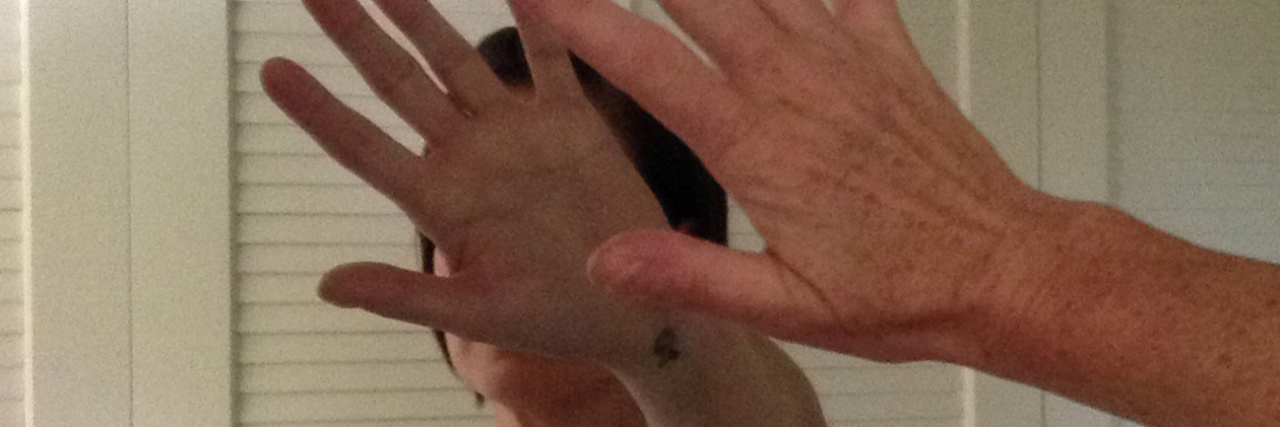Dealing With the Physical Aftermath of Breast Cancer Treatment
No one is in the bathroom with me, but I’m facing my enemy.
I pull the scale from its hiding spot between the toilet and the end of the vanity. It’s the perfect place since I’d honestly prefer crapping on it to stepping on it. I cringe.
Is this going to be a good day or a bad day? I’d better go pee first.
I drop my clothes, squeeze every ounce from my bladder, and then use my toe to tap the “on” button.
A rectangular zero blinks in the liquid crystal display. It isn’t ready to break my heart yet; it needs to warm up first. The numbers look just like the ones on my alarm clock, yet these are sinister.
The clock tells me what I know: I haven’t gotten enough sleep; it’s time to shuffle the kids to school; I’m late.
The scale tells me what I dread: I have zero will power, zero control over my life. And the weight I lost before I discovered my cancer and kept off during my treatment wasn’t the result of eating well and exercising, it was because my body was devouring calories to fuel the disease overtaking my breast.
The scale stops flashing — my cue to climb aboard. I hold my breath, think thin thoughts, and wait. I watch it blink, blink, blink… 147.
Shit.
I close my eyes, exhale and step off.
Every day starts the same: I will feel better; I will eat better; I will work out longer. And every day ends the same: I’m still so tired; I don’t feel like eating anything green; it was too hot to run.
The rational side of my brain perks up.
You have cancer, so what if you weigh 15 pounds more than you did?
But the chemo was six months ago and the radiation two. What if the weight has nothing to do with cancer or the stupid drugs I still take? What if I’m just weak?
Seven months ago I was in the best shape of my life, training for triathlons, the picture of health.
Then I felt the lump.
The scans and biopsies showed my doctors five small, aggressive tumors in my left breast, so my oncologist decided to pluck a few key lymph nodes from under my arm and test them for cancer, too. A lot hinged on that procedure, because if she found any, my treatment would be longer, harder, and involve radiation.
“We’ll take the sentinel node out and test it while you’re still on the table. If that one is positive, we will take the ones around it.” the doctor said. “If you wake up with a drain, you’ll know we found cancer.”
After navigating the haze of pain medications and anesthesia, I saw the tube sticking out from my armpit.
“Fuuuuuck,” I slurred to the doctor. “How many?”
“We took eight more.”
Though my road would be longer, I was lucky. The rest of the nodes were clean.
I made it through four-and-a-half months of intense chemotherapy, spending most of the time hiding in my house when I wasn’t helping others feel better about my situation. I joked, hugged, and smiled my way through the pickup line at the kids’ school, soccer practices, and holiday parties.
While I kept up the public show, often I went home exhausted and in tears.
“It’s a marathon, not a sprint,” my husband George commiserated.
“I know,” I said, “but they keep adding miles!”
I felt guilty whining. Two years before, his melanoma surged back after a six-year hiatus with such vengeance that doctors assumed he would die within weeks. I slept next to him in the ICU night after night, watching the treatment whither my oak of a man. And then I watched him come back to life.
When I was diagnosed, George reassured me I was strong, too. And when I looked in the eyes of the man who had been my partner for more than 20 years, I believed him.
Because I had the BRCA2 gene mutation my boobs had to go. Doctors cut across each pectoral muscle and scraped out every ounce of breast tissue, then shoved in thick plastic expanders halfway inflated with saline. Once a week my plastic surgeon dangled a magnet over each breast, waiting to see where it stuck to my skin. When he had his target, he buried the needle to inflate some more.
My chest ached for days after each round, leaving me grumpy and distracted. The surgeon stretched in six weeks what had taken puberty two years; my breasts were back to their 16-year-old size and perkiness.
When the doctors were satisfied with my inflation, it was on to radiation.
“You’ll probably feel some discomfort,” the doctor said.
Discomfort my ass. I felt pain and burning. By the end of two weeks my skin changed from light pink to a shade of crimson usually reserved for roses and nail polish. After six, it was crispy and blistered. I put the “raw” in bra.
Now, as I look in my bathroom mirror, even the skin made so angry from radiation is only a shade or two darker than the right. And yet there is not one part of my reflection that looks attractive to me.

I wonder if I will ever turn the corner and begin to accept what I see. Mastectomy scars bisect both breasts and there is a missing item of distinction from each: A nipple.
I know I should be thankful for this day, this life, this body. But right now all I see are the reminders of how much I have lost. Tears well and slowly fall down my cheeks.
A smile creeps across my face and I begin to giggle as the irony hits me: Here I am, hating my body, when I have tits just like Barbie. I wipe my eyes with the back of my hand, take a deep breath and start the shower.
Hot water pours over my face, washing away my tears, and I begin to feel better. I will dry off, refreshed, and start again.
This post was originally published on HuffPost.

